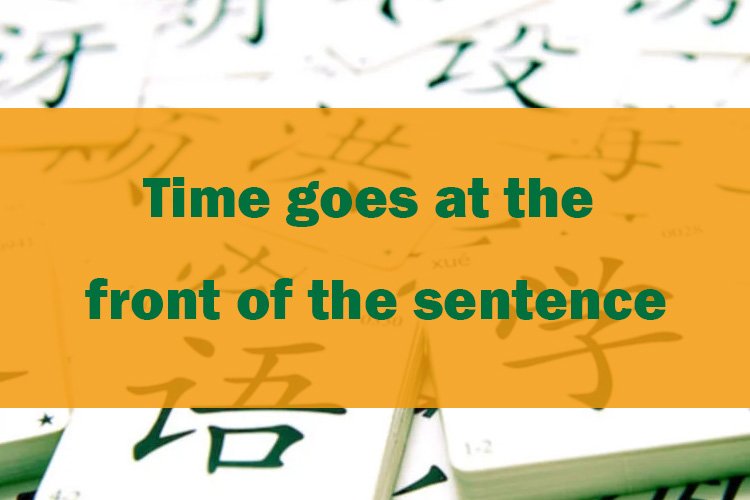Time Goes at the Front of the Sentence (Before or After the Subject)
So a bit different from what we're used to in English, in Mandarin time has a fixed place where it belongs in the sentence. We'll explore more later how we can break this and where exceptions exist, but for now let's create a rule for ourselves: THE TIME THAT SOMETHING HAPPENS GOES IN FRONT OF THE VERB. It will definitely feel kinda strange at first, but if we accept this as a rule and operate around that, we'll have it down in no time. 😁
In the examples below, we have the Chinese sentence, it's direct English translation, and then a native English translation. This is typical of how we will explain grammar in our classes.
| Subject + time + (location) + action |
|
Wǒ míngtiān qù zhōngguó. ——> I tomorrow go to China. |
|
Tā xīngqī yī lái xuéxiào. ——> He (on) Monday comes to school. |
|
Wǒ de tóngxué míngtiān xiàwǔ sāndiǎn kàn diànyǐng. ——> My classmate tomorrow afternoon 3:00 watches TV. |
|
Bàba jīntiān zàijiā hē kāfēi. ——> Dad today at home drinks coffee. |
Please read the “qù/lái” section for more information about coming and going.
The units of time words could range from years to a specific time.
In the third sentence, note that we put AM/PM in front of the time in Chinese. For example, wǎnshàng jiǔ diǎn(9pm), zǎoshàng liù diǎn(6am),xiàwǔ liǎngdiǎn(2pm).
Did you notice that in the last sentence, we have both time and location in one sentence? When we have both time and location in one sentence, we put time first, then location and the action: Subject + time + location + action
You’ve learned how to express “when to do what”. Now you probably are wondering how to ask “when” in Chinese. There are different ways of asking when:
“When” in general - shénme shíhou
Which month and/or which date - jǐyuè or jǐhào or jǐyuè jǐhào
Which day of the week - xīngqī jǐ
What time - jǐdiǎn
Subject + time question word + verb
|
Using shénme shíhou to ask “when” in general shénme shíhou literally means “what time”. When using this to ask a question, you can answer with any time unit. |
|
A: Nǐ shénme shíhou lái zhōngguó?——> You when come to China? (When will you come to China?) Possible answers: B: Wǒ míngnián sānyuè qù zhōngguó. ——> I next year March go to China. (I will go to China next March.) B: Wǒ míngtiān qù zhōngguó. ——> I tomorrow go to China. (I will go to China tomorrow) B: Wǒ míngtiān xiàwǔ liǎngdiǎn bàn qù zhōngguó. ——> I tomorrow afternoon 2:30 go to China. (I will go to China tomorrow at 2:30PM) |
|
|
Using jǐyuè or jǐhào or jǐyuè jǐhào to ask which month/which date jǐ is our question word, and it means how much/how many. yuè is month and hào is date. |
|
A: Jīntiān jǐyuè jǐhào? ——> Today is which month and which date? (What is today’s date?) B: Jīntiān sān yuè shíbā hào. ——> Today is March 18th. |
|
|
Using xīngqī jǐ to ask which day of the week Jǐ is a question word just like asking which month/which date. And xīngqī is week, so we are literally asking “week which number?”. |
|
A: Nǐ xīngqī jǐ xué zhōngwén?——> You which day of the week learn Chinese? (What day do you learn Chinese?) B: Wǒ xīngqī yī, xīngqī sān, hé xīngqī wǔ xué zhōngwén. ——> I Monday, Wednesday, and Friday learn Chinese. (I learn Chinese on Mondays, Wednesdays and Fridays.) |
|
Using jǐdiǎn to ask what time You know already, jǐ is our question word here and diǎn is o’clock. |
|
A: Xiànzài jǐdiǎn?Now what time? (What time is it?) B: Xiànzài shíèr diǎn líng wǔ fēn. ——> Now twelve o’clock zero five minute. (It’s 12:05 now) |
|


